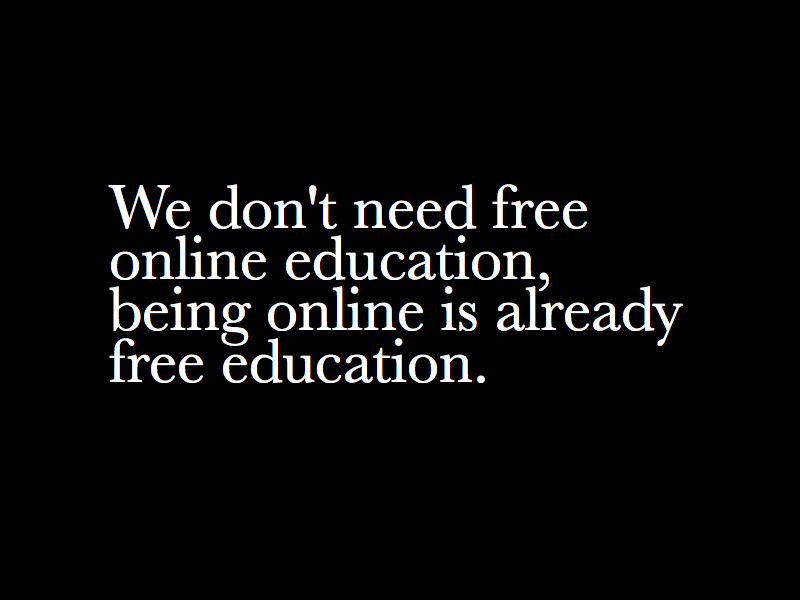Category Archives: Technology
I think the budding civil war in Ukraine is the perfectly legitimate excuse I’ve been waiting for to quit watching television altogether.
A list of excuses.
Is “loyalty”, “fans”, “fanbase” just narcissistic self-talk by careerists who wish they were rockstars?

“Your consumers are just someone else’s consumers who occasionally buy you.” The attack on brand loyalty has been raging for a while now with many referring to the emergence of user reviews etc, where consumers circumvent the traditional trust and promises of brands. Not only that, some, including Martin Weigel of W + K in Amsterdam argue that a brand’s revenue depend more on broad audiences than of depth of loyalty and refers to research where a majority of revenue is from one-time purchases rather than repeat purchase loyalists, arguing that “Fans produce publicity, not revenue.”
Weather that’s the case or not, how is it then that the idea of “fans”, “followers” have lodged itself so firmly in our collective conscious? Certainly social media (twitter, facebook) has a part where the metaphor of “brand personality”, and anthropomorphism of brands initiated by famed planner Stephen King of JWT may have been extended way beyond its usefulness (See this interview with Mark Tomblin or TAXI Canada.
“Compared to human relationships, brand relationships are thin” Martin Weigel argues, which might be true when brands overestimate the relationship people do have, and want to have with them. Another, and maybe more hypothetical reason for why more and more brands claim having “fans” (rather than customers) could be due to the rise of epithets like “Guru”, “Rockstar” traditionally preserved for great, significant achievements in art and religion suddenly emerged in more mundane contexts of the corporate and startup world, where the unglamorous “customers” by necessity turned into “fans” and “followers” in a form of narcissistic self-congratulatory fantasy inflating the significance of what most corporations (big or small) actually do – sell products and services to people. In our age of helicopter parenting, selfies and what psychologist Jean Twenge calls the “most narcissistic generation in history” could it be that most can’t live with the fact that (as opposed to real rockstars and guru’s) they have no significant “following”?
Doug Kessler from Velocity recently noted regarding the perceived lack of glamor of working with B2B content strategy that “It doesn’t have to be glamorous to be important, worth the effort, or interesting. There’s so many things other than glamour” which might not unsettle the more seasoned of professionals but might not sit very well with the grade-inflated “totally awesome” and “super-talented” generation.
Isn’t it time for brands to scrap their shot at glamour, reinstating “customer” in favour for the more submissive “fan”, and while doing so shifting focus away from themselves – to whom they serve, not necessarily writing a new War and Peace or Abbey Road but selling laundry detergent, office supplies or designing nifty tools like smartphones. We’ll go back to an existence of humble service, seeing revenue as a quiet token of gratitude of the maybe unglamorous but yet significant good we do while working for (some) brands. I think it was legendary Brand Strategist Wally Olins who once said “Brands that are good for people are best for business”. That should be enough shouldn’t it?
5 Biggest frustrations when Skyping your parents.
1. They think you’ve got all the time in the world.
“Hold on dear, I’ll just get myself a glass of wine.” A ten-minute window between house-chores and bedtime must be enough to Skype my mother right? Big mistake.
Solution: There is no way out of this one.
2. They think you’re available to talk anytime anywhere.
“What I’m up to? It’s Wednesday 1:30 PM Dad so what I’m doing is presenting some sales figures to some suppliers from southeast Asia!!!”
Solution: Create a separate account for work.
3. They think once you do talk, that’s an excellent time for tech-support.
“I can’t see you dear., “I need to raise the volume”, “I had some error message..x56ooo65ws” Computer issues usually consume a good five first minutes of every call. Did my grandmother ever have technical difficulties with her phone back in the day? Not until she developed Alzheimers.
Solution: Interrupt them with a “It’s not important and doesn’t matter”. Quickly follow up with a “What did you eat today?” to deflect the looming prospect of your mom reading you Windows error-messages out loud the last thirty minutes before bedtime. Also remember to bore them with vivid imagery and detailed descriptions to make your conversation seem much longer than it was. There’s nothing worse than leaving your parents hanging. It will keep you awake at night.
4. You need to look for them.
We spend more time looking for each other on Skype than actually speaking. Unless you set aside a time to talk, you won’t.
Solution: Schedule a time when to Skype.
5. They can’t find the f*@#n message window.
“Dad, I just posted the link three-thousands times in the chat-window and you still don’t see ANY notifications or ANYTHING blinking in the Skype window!!? Sound-alerts?”
6. They Skype about trivialities.
“Hi dear, you just got a letter in the mail from your University.”
“Mom, I graduated thirteen years ago…”
Silence.
Solution: Politely ask your parents to make a list of things that you can run through once you Skype during the weekend. When read out loud, don’t be afraid interrupt with a “Neeext.” as most of the issues will have no significance whatsoever.
How to cut down general Skyping-time with your parents.
1. Keep away from Skype.
2. Call them when they’re about to do something they love. (If pensioners see. “Having lunch.”)
My parents enjoy their breakfast, lunch and dinner with the same precision as astronomers predict solar-eclipses. That food takes supreme precedence in their daily routines is probably an understatement – thus, approximately fifteen minutes before suppertime is the perfect time to Skype. I know very well that once the craving for food sets in they’re so transfixed by their quest for satisfaction they’ll excuse themselves to go stuff their faces. “Oh Dad, you have to go? *Sigh* “too bad. Let’s talk next month.”
Why people are more likely to share insignificant things in Social Media.
People avoid sharing media which they haven’t consumed in full length as they have a harder time making sure there isn’t anything they disagrees with, let’s say at the end of a one hour presentation. Therefore, the more time-consuming a piece of information is, the less likely it is to be shared. Likewise, people avoid sharing really important things, as they are usually personal (See Worldview, Religion, Politics or tastes in Art, Literature and Music etc) and are naturally charged. Therefore, the more insignificant, bland and agreeable a piece of information is, the more likely it is to be shared. Which leads us to the conclusion that the shorter and more insignificant a piece of information is, the more likely it is to be shared in Social Media. And that’s probably exponentially related.

We don’t need free online education, being online is already free education.
Free education.
Jobs was not only the leader and visionary for Apple, but also for Samsung.
The vacuum left behind by Steve Jobs is getting more and more painfully obvious every day, here even witnessed among Apple’s competitors. Have you ever seen anything that makes you cringe more than this presentation + video by Samsung? Talk about being “off brand”, if they ever had one. Zero consistency equals zero culture.
http://www.codecademy.com/blog/71-how-kids-can-learn-to-code
http://lifehacker.com/how-and-why-to-teach-your-kids-to-code-510588878
http://www.tynker.com/blog/articles/stem-education/four-reasons-why-kids-should-learn-programming/
http://www.whiteboardmag.com/why-our-kids-need-to-learn-code-hint-its-not-to-churn-out-more-icters/
http://www.theguardian.com/education/2012/mar/31/why-kids-should-be-taught-code

